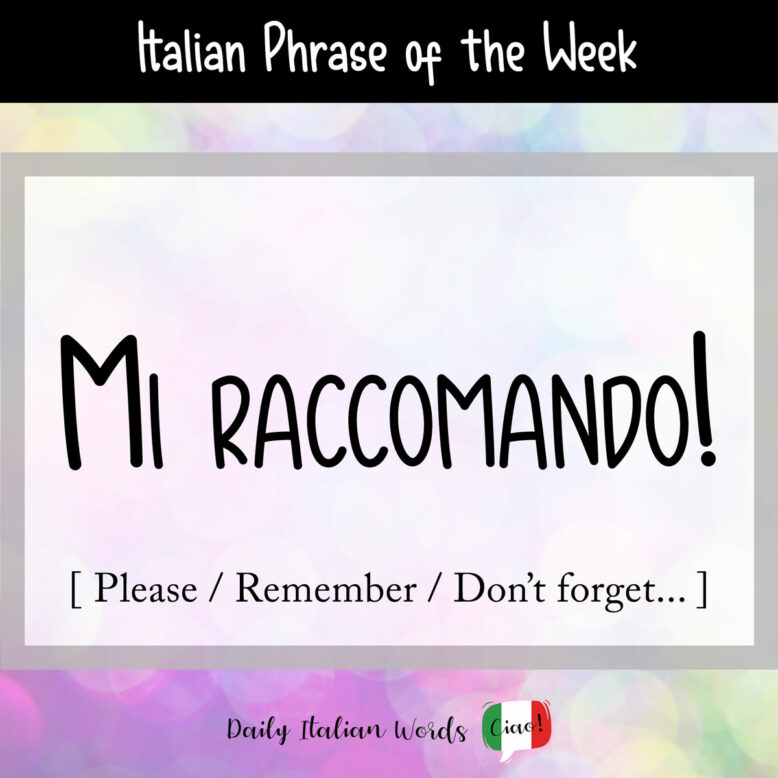Mi raccomando is one of those wonderfully Italian phrases that cannot easily be translated into English because there isn’t an exact equivalent.

It comes from the verb raccomandare which translates to recommend or to entrust but by making it reflexive (raccomandarsi) it becomes to plead with, to beg or to implore.
Mi sono raccomandato tanto con loro ma è stato inutile.
I pleaded with them but it was useless.
Pietro si è raccomandato con Laura di venire con lui.
Pietro begged Laura to come with him.
The phrase mi raccomando is often used when making a request or asking a favour of someone. It does the job of stressing how important or urgent the request is to the speaker, as well as his or her faith in the other person to fulfil the request.
It can be translated into English in a variety of ways:
- Now, remember…
- Please…
- Now, listen to me…
- Don’t forget…
- Please make sure…
- I’m counting on you.
- …got it?
- …okay?
Mi raccomando, non fare sciocchezze!
Now remember, don’t do anything silly, okay?
Mi raccomando, ragazzi, non bevete stasera. Avete l’esame domani!
Now, listen to me, boys, don’t drink tonight. You have the exam tomorrow!
Mi raccomando, non toccare niente!
I’m begging you, don’t touch anything!
Guarisci presto, mi raccomando!
Please get better soon!

One important thing to remember about mi raccomando is that you’d never use it to order someone to do something. It is much closer to an encouraging hint or friendly suggestion, and whether the other person chooses to take the advice is completely up to them.
Interestingly mi racommando can also appear on its own. In this case once again, it can mean a number of things in English.
Situation #1: A young man is about to go out for drinks with his friends.
His mother says “Mi raccomando!” (Be careful! I’m counting on you not to do anything stupid!)
Situation #2: A boy heads back to school after getting in trouble with his teacher.
His mother might say: “Mi raccommando, eh!” (Be good! Don’t get into trouble again!)
Situation #3: A group of friends are saying goodbye to each other after a nice meal.
One friend might say to another: “Ci vediamo presto! Mi raccomando!” (See you soon! Take care!)
The verb raccomandare can also mean to put in a good word for someone, especially when applying for a job. If you call someone a raccomandato/a, the implication is that they only got the job because they have connections or friends in the right places.
Il nuovo manager è un raccomandato. Lo hanno messo lì solo perché è figlio del direttore.
The new manager has friends in the right places. He is only there because he is the director’s son.
The feminine raccomandata also refers to registered mail.
Heather Broster is a graduate with honours in linguistics from the University of Western Ontario. She is an aspiring polyglot, proficient in English and Italian, as well as Japanese, Welsh, and French to varying degrees of fluency. Originally from Toronto, Heather has resided in various countries, notably Italy for a period of six years. Her primary focus lies in the fields of language acquisition, education, and bilingual instruction.


